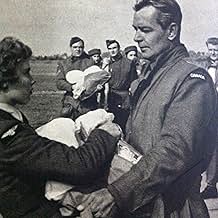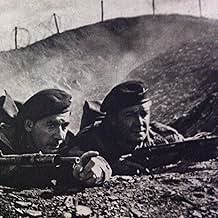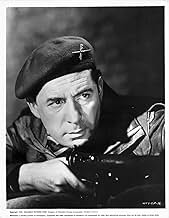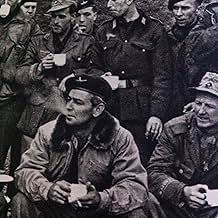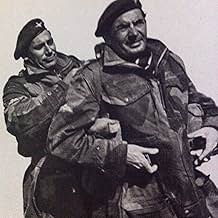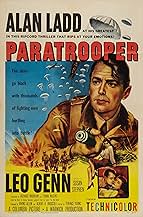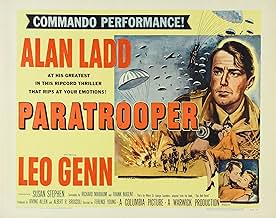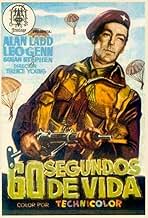Agrega una trama en tu idiomaIn 1940, an American claiming to be Canadian volunteers for the British Army's paratroop school.In 1940, an American claiming to be Canadian volunteers for the British Army's paratroop school.In 1940, an American claiming to be Canadian volunteers for the British Army's paratroop school.
- Dirección
- Guionistas
- Elenco
Opiniones destacadas
In real life, Alan Ladd was scared to death of flying (he preferred trains), but you'd never know it in this exciting action adventure set in early World War II.
The old English method of training paratroopers by jumping from balloons is accurately depicted, as is the result of landing with an unopened parachute (the British, like the German airborne, eschewed the use of reserve parachutes).
It's actually a pretty standard war movie, though the score is exciting and memorable, and the combat scenes, though dated now, are pretty well done, considering this movie was shot in 1953.
Definitely worth watching!
The old English method of training paratroopers by jumping from balloons is accurately depicted, as is the result of landing with an unopened parachute (the British, like the German airborne, eschewed the use of reserve parachutes).
It's actually a pretty standard war movie, though the score is exciting and memorable, and the combat scenes, though dated now, are pretty well done, considering this movie was shot in 1953.
Definitely worth watching!
This film is a very good look at the start of the British airborne forces during World War II. "Paratrooper" was released in America in late December 1953, more than four months after it premiered in the U. K. where it was called "The Red Beret." That is the name of the book from which the film is adapted, written by Hillary St. George Saunders.
Columbia studios clearly made the film for people on both sides of the pond. So, the plot includes an American who enlists in the British Army in Canada. That's OK, and we know quite a few American fliers joined the war effort early by serving in the RAF. Here it provides the love interest part of the film that Hollywood often included for wider audience appeal. But, I think any number of other actors might have filled the role better than Alan Ladd. His Private McKendrick (aka, "Canada") seemed to have a chip on his shoulder. We learn of his background halfway into the film, and one can understand his experience affecting him. But, not that he would be so touchy and angry toward other men. Whatever the reason, his character doesn't come across as genuine.
That aside, I give this film eight stars for its interesting and early look at jump school training and the start of the British Airborne. Years later, I served as a paratrooper in the U. S. 504th and 509th Airborne regiments (1962 through 1964). Americans train at the Ft. Benning, GA, jump school. I became familiar with the British Airborne while stationed in what was then West Germany. We had NATO (North Atlantic Treaty Organization) military exercises in Europe with the Brits, West Germans, and others. And, I was in charge of our airborne PIO (Public Information Office) when we sent one of our troopers through the British jump school. He photographed and reported on it. And, yes, the Brits were still jumping from balloons in training.
From its very beginning jump training has undergone changes, just as the aircraft, equipment and other things have changed. The film shows the first planes the Brits used. They were modified Wellington bombers and men dropped through an opening in the floor. Soon, "Dakotas" (Douglas C-47s) arrived from the U. S., and troopers jumped out of side doors behind the propellers. In 1962, I trained in C-119 "Flying Boxcars," and then jumped from C-130s (Hercules transports) and helicopters in Germany.
The Brits needed to make seven jumps to earn their parachutist wings. We had to make five jumps in the U. S. The film shows training in hand-to-hand combat. Americans got that in advanced infantry training before Jump School. We don't see any other physical training in the film, but all paratroopers have much more rigorous physical conditioning. One thing was glaring to me - I didn't see a single trooper land with a PLF (parachute landing fall). Maybe this wasn't developed until well after the war, but PLF landing had tremendous results in reducing injuries. In a nutshell, the trooper is trained to turn or orient his chute for a side landing, and then in a relaxed position as his feet touch the ground, he rolls his body to the right or left, with his calf, then hip, then side absorbing the impact. In the 17 jumps I made, I only got hurt once, when I landed on a big boulder right in the middle of my back.
In this movie, Stanley Baker plays one of the training cadre, Sgt. Breton. On the first airplane jump, his chute fails to open and he falls to his death. The Brits called his malfunction a Roman candle. In the American airborne, we call it a cigarette roll. But it's interesting that the Brits apparently didn't carry reserve chutes. They didn't appear to have them on in the film. So far as I know, American paratroopers always have had a reserve chute on the front. If anyone had a cigarette roll or other malfunction, he would release the main chute and pull the ripcord on his reserve. I saw half a dozen or more uses of the reserves in my airborne service. Some other things missing from this film were training jumps from towers. In one scene, I can see what looks like a 250-foot tower in the background. I also enjoyed the portrayal of the chute packing unit. It's too bad they didn't show the actual packing tables. And the funniest thing in this film is the strange looking headgear the Brits wore in jump school.
"Paratrooper" is a good portrayal of the early action of the British Airborne. I thank Steve Crook from London, who's review tipped me off to the background of Major Snow. Leo Genn plays the part very well in this film. Snow was John Frost in real life. He became best known after his paratrooper battalion took the north end of the Arnhem Bridge in Operation Market Garden in September 1944. The Brits held out four days against a German Panzer division. They were captured only after they ran out of ammunition. In the 1977 blockbuster movie, "A Bridge Too Far," Anthony Hopkins plays Lt. Col. Frost beautifully. Frost retired as a Major General in 1968, and was a close adviser on that film.
The only thing I see wrong in this movie is the name of the first operation the troopers had. Major Snow calls it "Operation Pegasus." In fact, it was called Operation Biting, also known as the Bruneval Raid. There was a real Operation Pegasus, and it was the escape plan across the Rhine River for many of the Brits trapped by the Germans in Operation Market Garden.
War movie fans and those who like history especially should enjoy this film.
Columbia studios clearly made the film for people on both sides of the pond. So, the plot includes an American who enlists in the British Army in Canada. That's OK, and we know quite a few American fliers joined the war effort early by serving in the RAF. Here it provides the love interest part of the film that Hollywood often included for wider audience appeal. But, I think any number of other actors might have filled the role better than Alan Ladd. His Private McKendrick (aka, "Canada") seemed to have a chip on his shoulder. We learn of his background halfway into the film, and one can understand his experience affecting him. But, not that he would be so touchy and angry toward other men. Whatever the reason, his character doesn't come across as genuine.
That aside, I give this film eight stars for its interesting and early look at jump school training and the start of the British Airborne. Years later, I served as a paratrooper in the U. S. 504th and 509th Airborne regiments (1962 through 1964). Americans train at the Ft. Benning, GA, jump school. I became familiar with the British Airborne while stationed in what was then West Germany. We had NATO (North Atlantic Treaty Organization) military exercises in Europe with the Brits, West Germans, and others. And, I was in charge of our airborne PIO (Public Information Office) when we sent one of our troopers through the British jump school. He photographed and reported on it. And, yes, the Brits were still jumping from balloons in training.
From its very beginning jump training has undergone changes, just as the aircraft, equipment and other things have changed. The film shows the first planes the Brits used. They were modified Wellington bombers and men dropped through an opening in the floor. Soon, "Dakotas" (Douglas C-47s) arrived from the U. S., and troopers jumped out of side doors behind the propellers. In 1962, I trained in C-119 "Flying Boxcars," and then jumped from C-130s (Hercules transports) and helicopters in Germany.
The Brits needed to make seven jumps to earn their parachutist wings. We had to make five jumps in the U. S. The film shows training in hand-to-hand combat. Americans got that in advanced infantry training before Jump School. We don't see any other physical training in the film, but all paratroopers have much more rigorous physical conditioning. One thing was glaring to me - I didn't see a single trooper land with a PLF (parachute landing fall). Maybe this wasn't developed until well after the war, but PLF landing had tremendous results in reducing injuries. In a nutshell, the trooper is trained to turn or orient his chute for a side landing, and then in a relaxed position as his feet touch the ground, he rolls his body to the right or left, with his calf, then hip, then side absorbing the impact. In the 17 jumps I made, I only got hurt once, when I landed on a big boulder right in the middle of my back.
In this movie, Stanley Baker plays one of the training cadre, Sgt. Breton. On the first airplane jump, his chute fails to open and he falls to his death. The Brits called his malfunction a Roman candle. In the American airborne, we call it a cigarette roll. But it's interesting that the Brits apparently didn't carry reserve chutes. They didn't appear to have them on in the film. So far as I know, American paratroopers always have had a reserve chute on the front. If anyone had a cigarette roll or other malfunction, he would release the main chute and pull the ripcord on his reserve. I saw half a dozen or more uses of the reserves in my airborne service. Some other things missing from this film were training jumps from towers. In one scene, I can see what looks like a 250-foot tower in the background. I also enjoyed the portrayal of the chute packing unit. It's too bad they didn't show the actual packing tables. And the funniest thing in this film is the strange looking headgear the Brits wore in jump school.
"Paratrooper" is a good portrayal of the early action of the British Airborne. I thank Steve Crook from London, who's review tipped me off to the background of Major Snow. Leo Genn plays the part very well in this film. Snow was John Frost in real life. He became best known after his paratrooper battalion took the north end of the Arnhem Bridge in Operation Market Garden in September 1944. The Brits held out four days against a German Panzer division. They were captured only after they ran out of ammunition. In the 1977 blockbuster movie, "A Bridge Too Far," Anthony Hopkins plays Lt. Col. Frost beautifully. Frost retired as a Major General in 1968, and was a close adviser on that film.
The only thing I see wrong in this movie is the name of the first operation the troopers had. Major Snow calls it "Operation Pegasus." In fact, it was called Operation Biting, also known as the Bruneval Raid. There was a real Operation Pegasus, and it was the escape plan across the Rhine River for many of the Brits trapped by the Germans in Operation Market Garden.
War movie fans and those who like history especially should enjoy this film.
At the time this film was made (1953) many of the men who took part in ww2 wearing the RED BERET were still around and expecting to see a movie depicting what they had accomplished, and the opening text pays tribute to them somewhat, the film then goes on to a disappointing plot about an American leading man Alan Ladd,whose sole purpose seems to be to sell the movie in the U.S. The action depicting the raid on the Bruneval radar installation is o.k. but the later action which I think is supposed to be the fight in Tunisia gives a very seedy type of appearance,amateur,and certainly unconvincing acting and generally cheap looking sets, possibly a gravel-pit somewhere,(I guess most of the budget was spent on the leading star's salary) although the training scenes were very accurate. It was shot at R.A.F. Abingdon,near Oxford, the Parachute Training School at that time, the Guardroom at the rear gate can be recognized, where they are issued with their Red Berets.Considering all the hard fighting that this regiment actually did in fact do in so many places this had the potential to be a great movie. What was required was a good plot,a good script and less of a romantic storyline and some tight direction, sadly this did not happen and no serious attempt at a movie was made about the heroic actions of the Airborne Forces until "A Bridge Too Far". Other movies like The Cruel Sea, Twelve O'Clock High, Bridge on the River Kwai, King Rat and Das Boot etc.depict the sacrifices made by these men accurately I think, the men who wore the Red Beret must have left this screening very disappointed,I certainly did. Worth having a copy in your collection as I have, if only to think of what might have been.
Like THEY WERE NOT DIVIDED, THE RED BERET is a 1950s war effort made by the team (Albert Broccoli, Terence Young, etc.) who would later go on to make the early James Bond films and thus kick-start a whole genre of cinema. This film stars Alan Ladd as an Canadian soldier who joins forces with a squad of British paratroopers to go on missions behind enemy lines in both France and North Africa.
It's a fairly typical war movie from the era, a little stodgy in places and ridiculous in others. The silly bar-room brawl is straight out of a western and seems to come from nowhere, it's so sudden. Ladd plays a perpetually grumpy fellow but Susan Stephen doesn't have any trouble falling for his less-than-ideal charms. The supporting cast of British talent is better: in his first film role, Harry Andrews is a scene-stealer as the RSM, and there are parts for Stanley Baker, Donald Houston, Anton Diffring, and Leo Genn.
THE RED BERET seems to be suffering from a low budget, because the action sequences aren't quite up to scratch and never convince too much, although there's a novel use for a bazooka which is worth something. The skydiving stuff is better and more thrilling, and Ladd's back story, when it eventually comes to light, is an acceptable one.
It's a fairly typical war movie from the era, a little stodgy in places and ridiculous in others. The silly bar-room brawl is straight out of a western and seems to come from nowhere, it's so sudden. Ladd plays a perpetually grumpy fellow but Susan Stephen doesn't have any trouble falling for his less-than-ideal charms. The supporting cast of British talent is better: in his first film role, Harry Andrews is a scene-stealer as the RSM, and there are parts for Stanley Baker, Donald Houston, Anton Diffring, and Leo Genn.
THE RED BERET seems to be suffering from a low budget, because the action sequences aren't quite up to scratch and never convince too much, although there's a novel use for a bazooka which is worth something. The skydiving stuff is better and more thrilling, and Ladd's back story, when it eventually comes to light, is an acceptable one.
If you`ve no interest in war movies THE RED BERET may just appear to be yet another B movie about the war . It contains all the old cliches like dying soldiers making a speech just before they draw their last breath and as soon as someone is tasked to do something dangerous they`ll do it in a completely blase manner then die in a blackly comical famous last words scene .There`s some corny dialogue from the American characters like " Holy cow , check out those crazy beefeaters " while the Brits are all stiff upper lipped . It should also be pointed out that the " location filming " in North Africa was obviously carried out somewhere else , my guess would be the Highlands of Scotland with its peat bogs and rolling hills . But despite these flaws I can remember seeing this film from my childhood where it retains a soft spot and watched it again for the first time in something like 30 years.
Despite the somewhat patchy production standards I wasn`t really disappointed with this movie and as an adult I was able to notice a few interesting points . One point is that it`s very very similar to SHANE . Both star Alan Ladd and he plays a very similar character in both , in this case a North American called McKendrick who has a guilty past . Also if you look at the production credits you`ll notice that the producer , screenwriter and director would almost 10 years later go on to make DR NO * a movie that changed the face of British cinema . In many ways THE RED BERET is much more enjoyable than most of the British war movies at the time probably down to the fact that it`s made in glorious technicolor rather than monochrome and I`ll probably be accused of being a heretic by saying that it`s more enjoyable than the depressing BAND OF BROTHERS a mini series that has a lot in common with THE RED BERET
* Watch the scene where Major Snow walks into the office and throws his hat onto a hat stand . Sean Connery also does this in the Terence Young directed Bond movies . No doubt a director trade mark
Despite the somewhat patchy production standards I wasn`t really disappointed with this movie and as an adult I was able to notice a few interesting points . One point is that it`s very very similar to SHANE . Both star Alan Ladd and he plays a very similar character in both , in this case a North American called McKendrick who has a guilty past . Also if you look at the production credits you`ll notice that the producer , screenwriter and director would almost 10 years later go on to make DR NO * a movie that changed the face of British cinema . In many ways THE RED BERET is much more enjoyable than most of the British war movies at the time probably down to the fact that it`s made in glorious technicolor rather than monochrome and I`ll probably be accused of being a heretic by saying that it`s more enjoyable than the depressing BAND OF BROTHERS a mini series that has a lot in common with THE RED BERET
* Watch the scene where Major Snow walks into the office and throws his hat onto a hat stand . Sean Connery also does this in the Terence Young directed Bond movies . No doubt a director trade mark
¿Sabías que…?
- TriviaStanley Baker is dubbed.
- ErroresRight before the raid on the airfield at Bone, some of the paratroops bolt for a taxiing DC-3 and, without official authorization, climb aboard, so as not to miss their chance to take part in the airborne assault. This DC-3 has distinctive side markings, including a very visible "602" on the tail. Yet, when these same paratroops jump from this same plane, the side markings are now completely different, not the least of which is the total absence of the "602" tail number. The serial appears as "TG602". TG602 was an RAF Handley Page Hastings C1, the standard RAF Transport Command aircraft used for para dropping and current at RAF Abingdon, in 1952-1953. RAF Hastings served at that time in a natural aluminum finish. The filming of this particular aircraft occurred prior to 12 January 1953, which is when it was lost in an accident in Egypt.
- ConexionesFeatured in Everything or Nothing (2012)
- Bandas sonorasRed River Valley
(uncredited)
Traditional, lyrics modified as a parachutists' song
Sung on the pub, and whistled and hummed throughout the film as a theme
Selecciones populares
Inicia sesión para calificar y agrega a la lista de videos para obtener recomendaciones personalizadas
- How long is Paratrooper?Con tecnología de Alexa
Detalles
- Fecha de lanzamiento
- Países de origen
- Idiomas
- También se conoce como
- Paratrooper
- Locaciones de filmación
- Productora
- Ver más créditos de la compañía en IMDbPro
Taquilla
- Presupuesto
- USD 700,000 (estimado)
- Tiempo de ejecución
- 1h 28min(88 min)
- Color
- Relación de aspecto
- 1.37 : 1
Contribuir a esta página
Sugiere una edición o agrega el contenido que falta

